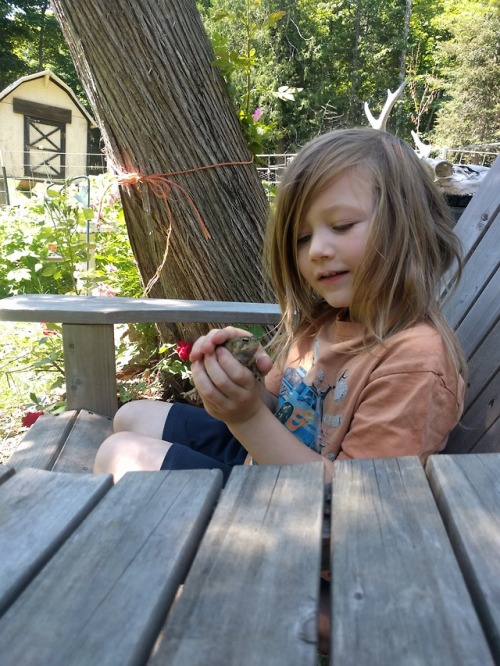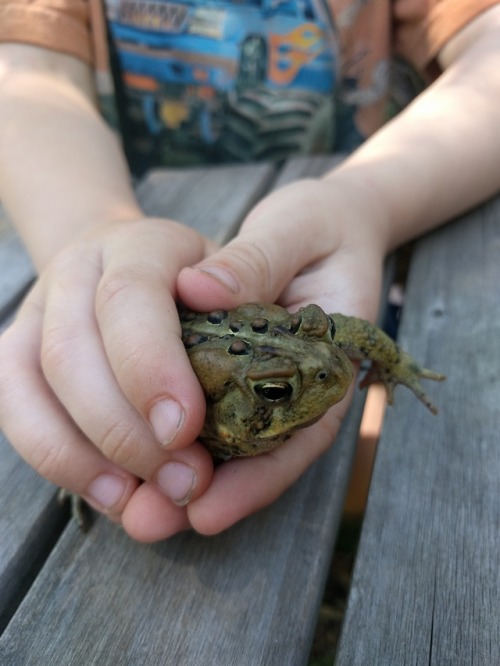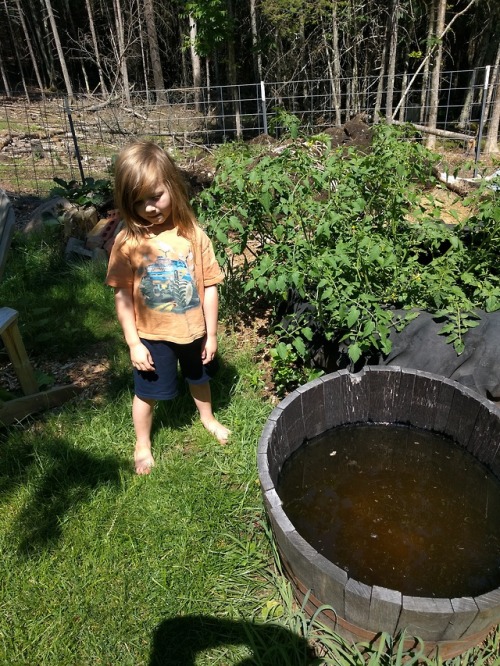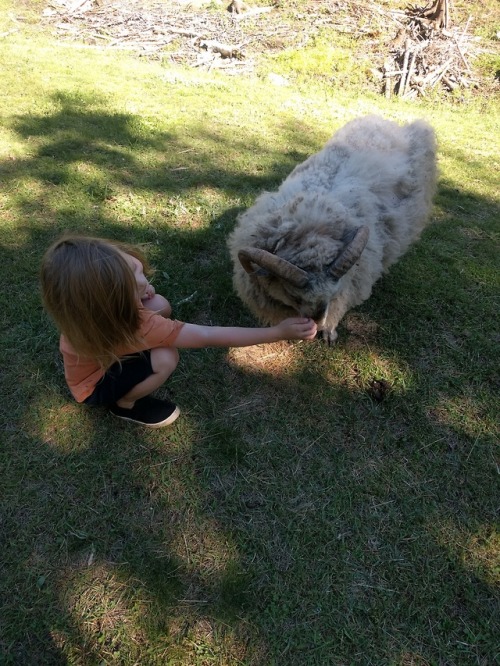#unschooling
What does a homeschool kid do all day?
We spend some time doing one-on-one work on paper and workbooks, but most of the time he’s living life by playing, exploring, and helping us. It turns out these are great ways to learn.
July 14, 2017
Post link
10 Maart: Dag van de Anarchie
March 10: Day of AnarchyPoster (one-sided, mimeographed, 33.8 x 21.4 cm) to announce the protests against the royal wedding procession of Princess Beatrix and Claus von Amsberg, taking place in Amsterdam, on March 10, 1966. Most copies of this poster were distributed as folded pamphlets, inserted in issue 7 of Provo magazine (February, 1966).
Although the poster is unsigned, in ‘Een Teken aan de Wand: Album van de Nederlandse Samenleving, 1963–1983’ (Promotheus, 1983) the design of the poster is attributed to Provo-affiliated cartoonist Willem (Bernard Willem Holtrop, born 1941).
The mirrored letter A obviously (and perfectly) symbolizes the notion of anarchy – but it’s not hard to see, in the mirrored A, also a reflection of the notion of printing itself. After all, most techniques of printing (whether it’s mimeograph, letterpress, offprint, or screenprint) involve processes in which images are either mirrored, turned upside-down or made negative. In that sense, this poster also represents the contrarian nature of printing itself: the idea that positive results can often only be achieved through negative actions.
Post link
Alexis Pauline Gumb, M Archive: After the End of the World:
“it was like that the last day we left the schools. all song. so many songs of the erstwhile schoolchildren freed and the generations crescendoing to meet us.
there was a time when no one would have ever thought there could be school abolition. except the sneaky privatization schemes that sought to destroy the students while keeping the buildings as monuments to how deep their theft could go.
it was the mothers who said it first. how total prison was. how the problem was not only their children being pushed out of school and into camps, but how the children drinking private school kool-aid were pipelined to more colorful camps. matriculating with programmed responses, like drones to kill the willing once they were made.
and the midlife crisis set who protested all the barbed wire put on their years as if learning was temporary. and what did they know?
ultimately it was the natural consequence of all our industrious work to make the air unbreathable, the water undrinkable, and the people uncritically unthinkable. at some point we needed all the different ages to solve all the problems we had excel-sheeted and databased into our lives.
so we abolished schools and prisons the same day. and the people came home singing and welcomed with song. what a noise. what a noise for every age.”
“What if school, as we used it on a daily basis, signaled not the name of a process or institution through which we could be indoctrinated, not a structure through which social capital was grasped and policed, but something more organic, like a scale of care. What if school was the scale at which we could care for each other and move together. In my view, at this moment in history, that is really what we need to learn most urgently.”
–Alexis Pauline Gumbs Undrowned: Black Feminist Lessons from Marine Mammals(viaKameelah Janan Rasheed’s Orange Tangent Study)
Post link
Kameelah Janan Rasheed lecture for RISD Graphic Design’s Spring 2020 Lecture Series
Why? See ALL THE TAGS (and, if only, the fifty plus more that got cut off when posting).
I love learning. It sounds a bit reductive, and unfinished as you might ask, “about what?” and feel unanswered when I respond with “everything.” I truly just like the process of gaining knowledge. Of course, specific interests come and go - as a child I spent a lot of time thinking about the Olympics and Japan, I moved on to geography and globalization in high / boarding school (with the occasional celebrity fascination), and in college I focused on development studies and identity studies. They all have led in some ways to one another, and that is one of the most fun things about growing older- you know more. You can move into sub-sectors, building deeper and more elaborate knowledge on specific examples, and then even be able to produce the knowledge yourself!
I loved my entire formal education because it nurtured my curiosity and gave me the tools and people to answer my questions and to prod deeper. I was very fortunate to go to both a boarding school and a university where students are invited, suggested, and even pushed to develop their own learning path- decide what they want to learn about, and then do that. But at the same time, there do exist parameters of some requirements, and even if you are in a class you want, the syllabus will always have a dull section and there may be limits on how you can pursue your research and present your findings (i.e you may have to google stuff and give a powerpoint, whereas you really want to travel somewhere and make a documentary). What I’ve liked most about being in “the real world” the past few months is that I feel like the slate is clean- I don’t have to keep learning new things if I don’t want to (no more picking classes every 6 months) but seeing that I do want to, I can pick anything and do it however I’d like!
In these few months since graduation, what I’ve kept myself busy thinking about are religion and spirituality, the Rwandan genocide and development in the country since then, class and privilege - especially in young adults, North Korea, and professional tennis. It is clear that these interests are too many to focus on equally and that some will remain overtime and my knowledge will deepen, and some will be more ephemeral- a book or two, a documentary, and a few conversations.
In thinking about these levels of knowledge across issues, and specifically when on a RwandAir flight to Kigali asking myself, “how much do I really know about Rwanda?” I came up with the process of The Growth of Knowledge below:
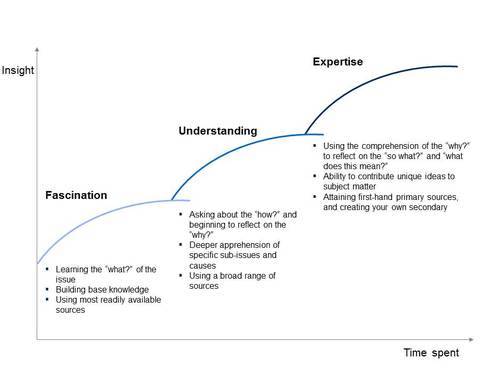
It is very simple yet, I think, also useful in giving some sort of direction in reflecting on how knowledge on a subject evolves- and importantly- how the level of insight grows with each step. It is also important to note that for different issues each step may take longer or shorter, requiring less effort to move between them, than the others. For example, it is very easy to be fascinated by an event like the Rwandan genocide, but the learning curve to get up to understanding is very steep. Alternatively, moving from fascination to understanding about professional tennis is much easier. In this example it comes down to the difficulty of the content itself: comprehending human emotion and causes of violence is much more complicated than understanding the way a sport works. But the learning curve can also be hindered or catalyzed by the availability of or access to knowledge- for example it is impossible to learn specific things about North Korea because it is well-guarded and secretive, but the Korean language itself is in countless books, media, etc so access to acquiring that knowledge is easier.
What divides the three steps of course, also depends on the subject matter, but can be assessed based on four- very interrelated questions (partly in the graph itself as bullet points).
- The first is"why you know?“ - going from a general interest to deeper desire for holistic knowledge and increasing insight.
- Second, "What you know?” which starts with the basic facts and figures, grows into various sub-sectors of knowledge, and increases further with first-hand personal understanding.
- Third, “How you know?” starting with the most readily available and easy to access information and then growing in specificity, complexity, and personal unique information from experience and exposure.
- Fourth, “What you do with what you know?” this goes back to how insight increases with each step. It involves deeper and deeper questioning and clarifying those who know more until slowly you become that someone who “knows more.” You must then begin to think about how to present the information and analyze what is important, what needs to be further examined, and then begin to do that examining yourself and helping others to go through the steps towards knowledge.
Again, this is a simple tool for reflecting and in few ways is it quantifiable or scientific- but I think it is useful in asking the important questions of “How can we learn?” and “How much do we know?” and to also show that growing in knowledge to expertise requires an increase in insight most of all- that constantly reading simple books on a subject will never make you really understand- we need to increase the complexity and push ourselves to build our insight. The tool also gives direction and reasoning to learning more and what to do when we know more- it is almost a motivation or a map of learning.
To end, I must say that similarly to the model itself, I feel that “liking to learn” can be a process on its own accord- and that the model helps to move from “understanding” learning to “expertise” on learning- and as I continue to think more about learning and talk with others who know much more, the model will adapt.
Keep thinking and keep learning!
#Repost @lolanaturodoula
・・・
Et c'est reparti pour 5 années de piraterie.
Pirate de la santé
Pirate de la consommation
Pirate de la naissance
Pirate du maternage
Pirate de l'éducation…
Pirate et fière de l'être.
On hisse l'étendard, on reprend la mer, on se bat pour nos libertés, pour la Liberté.
“La piraterie a toujours accompagné l'aventure humaine comme un marqueur de révolte. Il est le symptôme de ces situations où des rois, toujours plus puissants (peu importe leur titre en réalité), étendent leur emprise au point qu'il faille toujours plus de savants compromis, de résignations et de courbettes pour trouver une place dans leur société.
Le pirate est celui qui se lève, quitte la table, ne joue plus au jeu. Il ne reconnaît plus l'oppression de l'Etat comme légitime. ”
“Le monde des gens bien, civilisés, n'a jamais pu éliminer la piraterie. Qu'on les ait mis au ban de la société, déclarés ennemis du genre humain, pendus à l'entrée des ports de Londres ou Boston, il y a toujours eu des marins pour tenter l'aventure. Pas par choix, mais par nécessité. ”
Ces extraits sont tirés de l'excellent ouvrage de @thierry.pardo, “De la piraterie en éducation - pour une mutinerie enseignante” qui est à mettre entre toutes les mains, que l'éducation vous intéresse particulièrement ou non. Car nous avons toutes et tous passé entre 15 et 25 ans sur les bancs de l'école et pour comprendre les enjeux et comportements sociétaux actuels il faut comprendre ce qui se joue au coeur de notre système éducatif.
“C'est en étant libre qu'on apprend à être libre et en faisant des choix que l’on s'exerce à faire les bons. L'inverse est malheureusement vrai. C'est en étant déresponsabilisé, enfermé, contraint que l'on s'habitue et apprend à trouver normaux l'ordre, la réclusion et la contrainte. Ces habitudes sont même érigées au rang de valeurs et tissent la conformité nécessaire à un parcours [… ] réussi” (réussite sociale et professionnelle aux yeux de la société garantie par l'adhésion à la “bonne” morale).
Je rêve d'un autre avenir pour mon fils.
Et je le construis.
#liberté #piraterie #pirate #santealternative #autonomie #unschooling #ief #freedom #resiste #résistance
https://www.instagram.com/p/CdIKS7nufPQ/?igshid=NGJjMDIxMWI=
Post link

